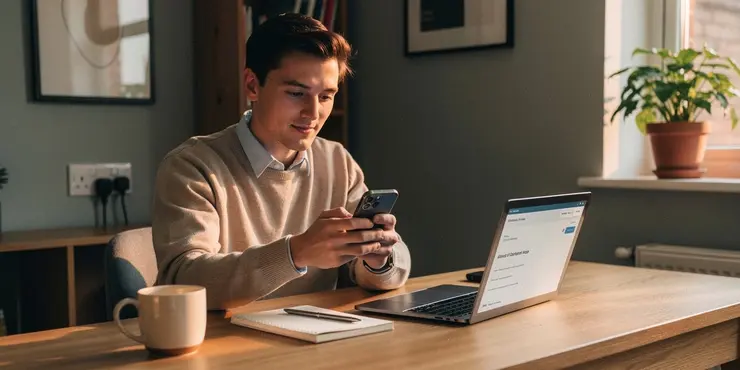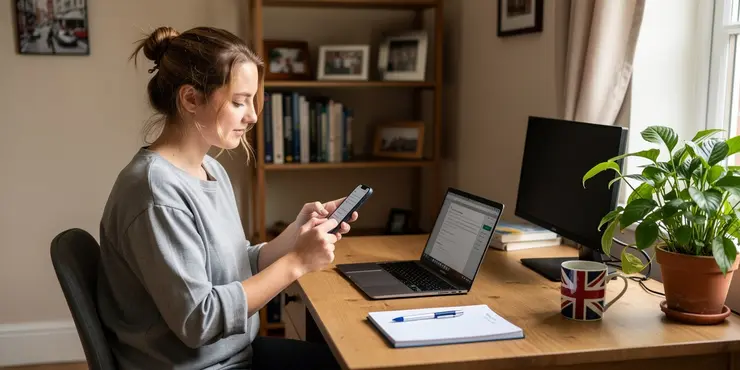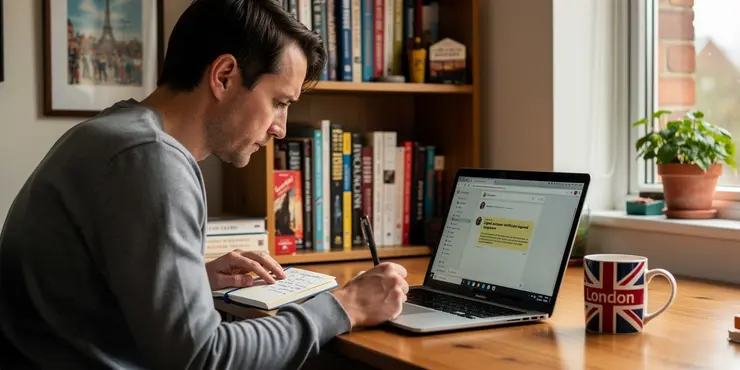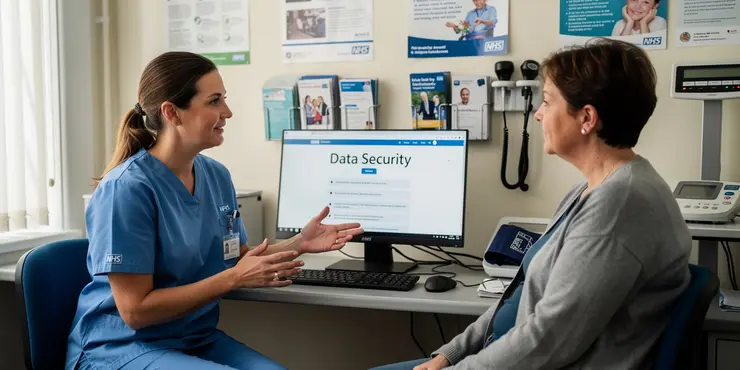
Find Help
More Items From Ergsy search
-

What is two-factor authentication?
Relevance: 100%
-

Can enabling two-factor authentication help if my email is hacked?
Relevance: 98%
-

What is two-factor authentication (2FA) and should I use it?
Relevance: 97%
-

How does two-factor authentication help protect my account?
Relevance: 77%
-

Will changing my password secure my hacked account?
Relevance: 39%
-

How do I secure my online accounts?
Relevance: 37%
-

What steps can I take to prevent future hacks?
Relevance: 37%
-

How can I keep my apps secure?
Relevance: 36%
-

Should I change my passwords regularly?
Relevance: 35%
-

How can I secure my email after a hack?
Relevance: 35%
-

What should I do if I find my information in a data breach?
Relevance: 34%
-

Are there any tools provided by social media platforms to increase security?
Relevance: 34%
-

Can antivirus software protect my email from being hacked?
Relevance: 34%
-

What should I do if I notice suspicious login attempts?
Relevance: 34%
-

How can I recover a hacked email account?
Relevance: 33%
-

How can I protect my privacy on my mobile phone?
Relevance: 32%
-

How secure is the Ring Doorbell Camera system?
Relevance: 32%
-

Why are emails often targeted in data breaches?
Relevance: 32%
-

How should I secure my mobile phone?
Relevance: 31%
-

How do I know if my personal information was part of a data breach?
Relevance: 31%
-

How do I know if my email has been hacked?
Relevance: 31%
-

What preventive measures can I take to protect my email from being hacked?
Relevance: 30%
-

Can unexpected calendar events be a sign of a hacked email?
Relevance: 30%
-

Is it safe to use public Wi-Fi to check my email?
Relevance: 30%
-

How do I know if my password has been hacked?
Relevance: 30%
-

Why are there login attempts from unfamiliar locations in my email activity?
Relevance: 30%
-

How can phishing attacks lead to social media hacks?
Relevance: 30%
-

How can I educate myself about potential online threats?
Relevance: 30%
-

How do I know if my social media accounts have been hacked?
Relevance: 30%
-

Why does my email appear to be sending spam?
Relevance: 29%
-

Can a sudden decrease or increase in followers indicate a hack?
Relevance: 29%
-

What are the security features of the digital driving license?
Relevance: 29%
-

What happens if someone loses access to their mobile device?
Relevance: 29%
-

Why am I receiving password reset emails I didn't request?
Relevance: 29%
-

What does it mean if my friends receive spammy messages from my account?
Relevance: 29%
-

Can Monzo or Revolut accounts be hacked easily?
Relevance: 29%
-

What are some signs that my email might be hacked?
Relevance: 28%
-

What should I do if I suspect a scam?
Relevance: 28%
-

What should I do if I notice unfamiliar emails in my sent folder?
Relevance: 27%
-

Can I prevent my data from being included in a breach?
Relevance: 27%
What is Two-Factor Authentication?
Two-factor authentication (2FA) is a security process that requires users to provide two different types of information to verify their identity. By asking for two separate pieces of evidence, 2FA significantly enhances the security of online accounts, protecting them from unauthorized access even if the primary password is compromised.
How Does Two-Factor Authentication Work?
The standard 2FA process involves the user first entering their username and password. This is known as the first factor—something the user knows. Once the correct credentials are entered, a second factor—usually something the user has—is required. This could be a one-time code sent via SMS, email, or generated by an app. Alternatively, some systems use physical tokens or biometric factors such as fingerprints.
Why is Two-Factor Authentication Important?
Cybersecurity threats are becoming increasingly sophisticated, and stealing passwords is a common tactic used by hackers. With 2FA, even if a cybercriminal obtains your password, they still cannot access your account without the second factor. This adds a critical layer of security, mitigating the risk of data breaches and identity theft.
Types of Two-Factor Authentication
There are several forms of 2FA, each offering varying levels of security:
1. SMS and Email Verification: A code is sent to the user’s mobile phone or email address, which must be entered after the password.
2. Authenticator Apps: Apps like Google Authenticator or Authy generate time-based, one-time codes that users enter upon logging in.
3. Hardware Tokens: Physical devices like YubiKeys that generate codes or connect to a computer to verify identity.
4. Biometric Verification: Uses fingerprint, facial recognition, or voice patterns as the second factor.
Implementing Two-Factor Authentication in the UK
In the UK, many banks, email providers, and social media platforms offer 2FA to enhance user security. It is often free to use, and setting it up is a straightforward process guided by the host service’s instructions. Services like HMRC, PayPal, and most major banks strongly encourage or even require 2FA to ensure that sensitive data remains secure.
Conclusion
Two-factor authentication is an essential tool in protecting your online presence. By adding an additional layer of security, it significantly reduces the likelihood of unauthorized access. In an age where digital threats are rampant, enabling 2FA is a prudent step for anyone concerned about safeguarding their personal information.
What is Two-Factor Authentication?
Two-factor authentication, or 2FA, is a way to keep online accounts safe. It asks you to prove who you are in two different ways. This makes it harder for anyone to get into your account, even if they have your password.
How Does Two-Factor Authentication Work?
First, you type your username and password. This is the first step, or "factor." Then, you need to do something else. This second step could be entering a special code sent to your phone, email, or an app. Sometimes, you might use a small device or your fingerprint.
Why is Two-Factor Authentication Important?
Online thieves are good at stealing passwords. 2FA helps stop them. Even if someone knows your password, they need the second step to get into your account. This keeps your information safe.
Types of Two-Factor Authentication
There are different ways to use 2FA:
1. SMS and Email Verification: You get a code on your phone or email and enter it after your password.
2. Authenticator Apps: Apps like Google Authenticator or Authy give you a code to enter.
3. Hardware Tokens: Small devices like YubiKeys that help check who you are.
4. Biometric Verification: Use your fingerprint, face, or voice to prove it's you.
Implementing Two-Factor Authentication in the UK
Many services in the UK, like banks and social media, offer 2FA. It helps keep your information safe. It usually costs nothing and is easy to set up. Follow the instructions from your bank or online service to turn it on.
Conclusion
Two-factor authentication helps protect you online. It adds extra security to your accounts. This is important because there are many online dangers. Using 2FA is a smart way to keep your personal information safe.
Frequently Asked Questions
Useful Links
This website offers general information and is not a substitute for professional advice.
Always seek guidance from qualified professionals.
If you have any medical concerns or need urgent help, contact a healthcare professional or emergency services immediately.
Some of this content was generated with AI assistance. We’ve done our best to keep it accurate, helpful, and human-friendly.
- Ergsy carfully checks the information in the videos we provide here.
- Videos shown by Youtube after a video has completed, have NOT been reviewed by ERGSY.
- To view, click the arrow in centre of video.
- Most of the videos you find here will have subtitles and/or closed captions available.
- You may need to turn these on, and choose your preferred language.
- Go to the video you'd like to watch.
- If closed captions (CC) are available, settings will be visible on the bottom right of the video player.
- To turn on Captions, click settings .
- To turn off Captions, click settings again.
More Items From Ergsy search
-

What is two-factor authentication?
Relevance: 100%
-

Can enabling two-factor authentication help if my email is hacked?
Relevance: 98%
-

What is two-factor authentication (2FA) and should I use it?
Relevance: 97%
-

How does two-factor authentication help protect my account?
Relevance: 77%
-

Will changing my password secure my hacked account?
Relevance: 39%
-

How do I secure my online accounts?
Relevance: 37%
-

What steps can I take to prevent future hacks?
Relevance: 37%
-

How can I keep my apps secure?
Relevance: 36%
-

Should I change my passwords regularly?
Relevance: 35%
-

How can I secure my email after a hack?
Relevance: 35%
-

What should I do if I find my information in a data breach?
Relevance: 34%
-

Are there any tools provided by social media platforms to increase security?
Relevance: 34%
-

Can antivirus software protect my email from being hacked?
Relevance: 34%
-

What should I do if I notice suspicious login attempts?
Relevance: 34%
-

How can I recover a hacked email account?
Relevance: 33%
-

How can I protect my privacy on my mobile phone?
Relevance: 32%
-

How secure is the Ring Doorbell Camera system?
Relevance: 32%
-

Why are emails often targeted in data breaches?
Relevance: 32%
-

How should I secure my mobile phone?
Relevance: 31%
-

How do I know if my personal information was part of a data breach?
Relevance: 31%
-

How do I know if my email has been hacked?
Relevance: 31%
-

What preventive measures can I take to protect my email from being hacked?
Relevance: 30%
-

Can unexpected calendar events be a sign of a hacked email?
Relevance: 30%
-

Is it safe to use public Wi-Fi to check my email?
Relevance: 30%
-

How do I know if my password has been hacked?
Relevance: 30%
-

Why are there login attempts from unfamiliar locations in my email activity?
Relevance: 30%
-

How can phishing attacks lead to social media hacks?
Relevance: 30%
-

How can I educate myself about potential online threats?
Relevance: 30%
-

How do I know if my social media accounts have been hacked?
Relevance: 30%
-

Why does my email appear to be sending spam?
Relevance: 29%
-

Can a sudden decrease or increase in followers indicate a hack?
Relevance: 29%
-

What are the security features of the digital driving license?
Relevance: 29%
-

What happens if someone loses access to their mobile device?
Relevance: 29%
-

Why am I receiving password reset emails I didn't request?
Relevance: 29%
-

What does it mean if my friends receive spammy messages from my account?
Relevance: 29%
-

Can Monzo or Revolut accounts be hacked easily?
Relevance: 29%
-

What are some signs that my email might be hacked?
Relevance: 28%
-

What should I do if I suspect a scam?
Relevance: 28%
-

What should I do if I notice unfamiliar emails in my sent folder?
Relevance: 27%
-

Can I prevent my data from being included in a breach?
Relevance: 27%


